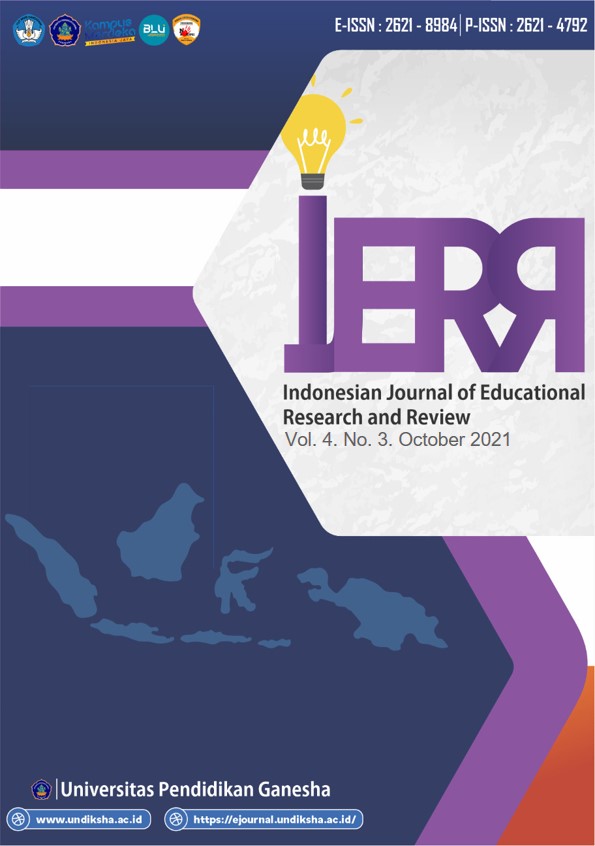Student Involvement in Community Activities Related to Educational Programs
DOI:
https://doi.org/10.23887/ijerr.v4i3.40580Keywords:
civic education, civic engagement, people’s schoolAbstract
The development of the object of study of citizenship education material is not fixed in classrooms carried out in formal schools, but can also be carried out in community activities known as socio-cultural citizenship. This is the purpose of this study by describing the application of civic education in the social sphere, namely the involvement of students from various universities who are members of the Atap Senja Community School. The method used is a case study on student involvement in community activities related to educational programs carried out in the community. The results of this study indicate that the concept of civic civic education can be carried out by involving community civic education that develops in the community, namely the Atap Senja Community School in Yogyakarta. This community consists of students from various universities in Yogyakarta. Activities carried out by providing learning assistance and attention to the development of morality for children who do not receive formal education at school. Funding for activities carried out by this community comes from membership fees or what has been called volunteers. The activities carried out by this community are proof of the participation of young citizens in changing the educational conditions of school dropouts, with various kinds of financial limitations. This can be interpreted as a form of civic engagement with the state, because indirectly these community activities will also affect and improve the conditions of education in Indonesia.
References
Adler, R. P., & Goggin, J. (2005). What do we mean by “civic engagement”? Journal of Transformative Education, 3(3), 236–253. https://doi.org/10.1177/1541344605276792.
Arif, D. B. (2016). Pengembangan komponen kompetensi kewargaan dalam buku teks Pendidikan Kewarganegaraan SMP/MTs. Jurnal Civics: Media Kajian Kewarganegaraan, 13(1). https://doi.org/10.21831/civics.v13i1.11076.
Cohen, A. K., Littenberg-Tobias, J., Ridley-Kerr, A., Pope, A., Stolte, L. C., & Wong, K. K. (2018). Action civics education and civic outcomes for urban youth: An evaluation of the impact of Generation Citizen. Citizenship Teaching & Learning, 13(3), 351–368. https://doi.org/10.2307/20054172.
Cresswell, J. W. (2012). Educational Research. Pearson.
Gustama, I. W. (2019). Penerapan Model PBL (Problem Based Learning) Untuk Meningkatkan Keterampilan Kewarganegaraan (Civic Skills) Siswa Kelas Xi IA6 Sma Negeri 1 Singaraja Tahun Pelajaran 2013/2014. Jurnal Pendidikan Kewarganegaraan Undiksha, 7(1). https://doi.org/10.23887/jpku.v7i1.22074.
Kerr, D. (1999). Citizenship education in the curriculum: An international review. School Field, 10(3/4), 5–32. https://doi.org/10.1.1.585.2377.
Komalasari, K. (2011). Kontribusi pembelajaran kontekstual untuk pengembangan kompetensi kewarganegaraan peserta didik SMP di Jabar. Mimbar: Jurnal Sosial Dan Pembangunan, 27(1), 47–55. https://media.neliti.com/media/publications/7407-ID-kontribusi-pembelajaran-kontekstual-untuk-pengembangan-kompetensi-kewarganegaraa.pdf.
Lickona, T. (2004). Character matters: How to help our children develop good judgment, integrity, and other essential virtues. Simon and Schuster.
Meyer, C. L., Harned, M., Schaad, A., Sunder, K., Palmer, J., & Tinch, C. (2016). Inmate Education as a Service Learning Opportunity for Students: Preparation, Benefits, and Lessons Learned. Teaching of Psychology, 43(2), 120–125. https://doi.org/10.1177/0098628316636278.
Misla, M., & Mawardi, M. (2020). Efektifitas PBL dan Problem Solving Siswa SD Ditinjau dari Kemampuan Berpikir Kritis. Jurnal Ilmiah Sekolah Dasar, 4(1), 60–65. https://doi.org/10.23887/jisd.v4i1.24279.
Nuryadi, M. H. (2020). The Pattern of the Teaching of Multiculturalism-Based Civics Education: A Case Study at Higher Education Institutions. European Journal of Educational Research, 9(2), 799–807. https://eric.ed.gov/?id=EJ1250401.
Pangalila, T. (2017). Peningkatan Civic Disposition Siswa Melalui Pembelajaran Pendidikan Kewarganegaraan (PKn). Jurnal Pendidikan Kewarganegaraan, 7(1), 91–103. http://103.123.108.111/handle/123456789/426.
Schulz, W., Ainley, J., Fraillon, J., Kerr, D., & Losito, B. (2010). ICCS 2009 International Report: Civic Knowledge, Attitudes, and Engagement among Lower-Secondary School Students in 38 Countries. International Association for the Evaluation of Educational Achievement. http://eric.ed.gov/?id=ED520018.
Soapatty, L. (2014). Pengaruh Sistem Sekolah Sehari Penuh (Full Day School) Terhadap Prestasi Akademik Siswa SMP Jati Agung Sidoarjo. Kajian Moral Dan Kewarganegaraan, 2(2), 719–733.
Sofyan, F. S., & Sundawa, D. (2016). Hubungan Mata Kuliah Pendidikan Kewarganegaraan Dengan Peningkatan Wawasan Kebangsaan Dan Semangat Nasionalisme Mahasiswa. Jurnal Pendidikan Ilmu Sosial, 24(2), 185. https://doi.org/10.17509/jpis.v24i2.1455.
Supriyadi, E. (2015). Pendidikan dan Penilaian Karakter di Sekolah Menengah Kejuruan. Jurnal Cakrawala Pendidikan, 2. https://doi.org/10.21831/cp.v0i2.7590.
Suyatno, S., & Wantini, W. (2018). Humanizing the Classroom: Praxis of Full Day School System in Indonesia. International Education Studies, 11(4), 115. https://doi.org/10.5539/ies.v11n4p115.
Torney-Purta, J. (2002). The school’s role in developing civic engagement: A study of adolescents in twenty-eight countries. Applied Developmental Science, 6(4), 203–212. https://doi.org/10.1207/S1532480XADS0604_7.
Torney‐Purta, J., Cabrera, J. C., Roohr, K. C., Liu, O. L., & Rios, J. A. (2015). Assessing Civic Competency and Engagement in Higher Education: Research Background, Frameworks, and Directions for Next‐Generation Assessment. ETS Research Report Series, 2015(2), 1–48. https://doi.org/10.1002/ets2.12081.
Trisiana, A. (2020). Penguatan pembelajaran pendidikan kewarganegaraan melalui digitalisasi media pembelajaran. Jurnal Pendidikan Kewarganegaraan, 10(2), 31–41. https://ppjp.ulm.ac.id/journal/index.php/pkn/article/view/9304.
Winataputra, U. S., & Budimansyah, D. (2007). Civic Education: Konteks, Landasan, Bahan Ajar dan Kultur Kelas. UPI.
Downloads
Published
How to Cite
Issue
Section
License
Authors who publish with the Indonesian Journal of Educational Research and Review (IJERR) agree to the following terms:
- Authors retain copyright and grant the journal the right of first publication with the work simultaneously licensed under a Creative Commons Attribution License (CC BY-SA 4.0) that allows others to share the work with an acknowledgment of the work's authorship and initial publication in this journal.
- Authors are able to enter into separate, additional contractual arrangements for the non-exclusive distribution of the journal's published version of the work (e.g., post it to an institutional repository or publish it in a book), with an acknowledgment of its initial publication in this journal.
- Authors are permitted and encouraged to post their work online (e.g., in institutional repositories or on their website) prior to and during the submission process, as it can lead to productive exchanges, as well as earlier and greater citation of published work. (See The Effect of Open Access)












